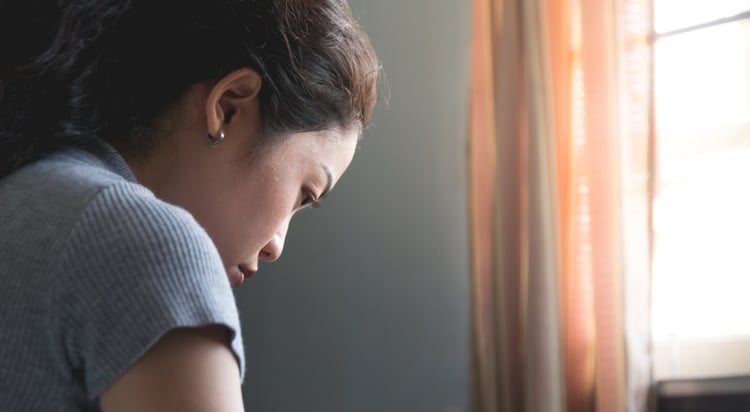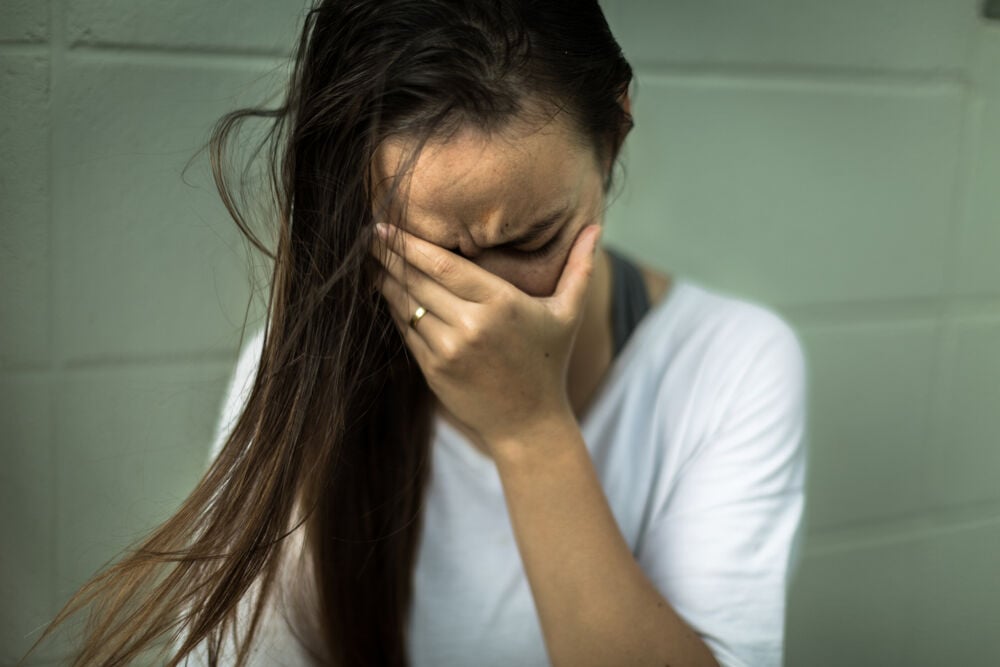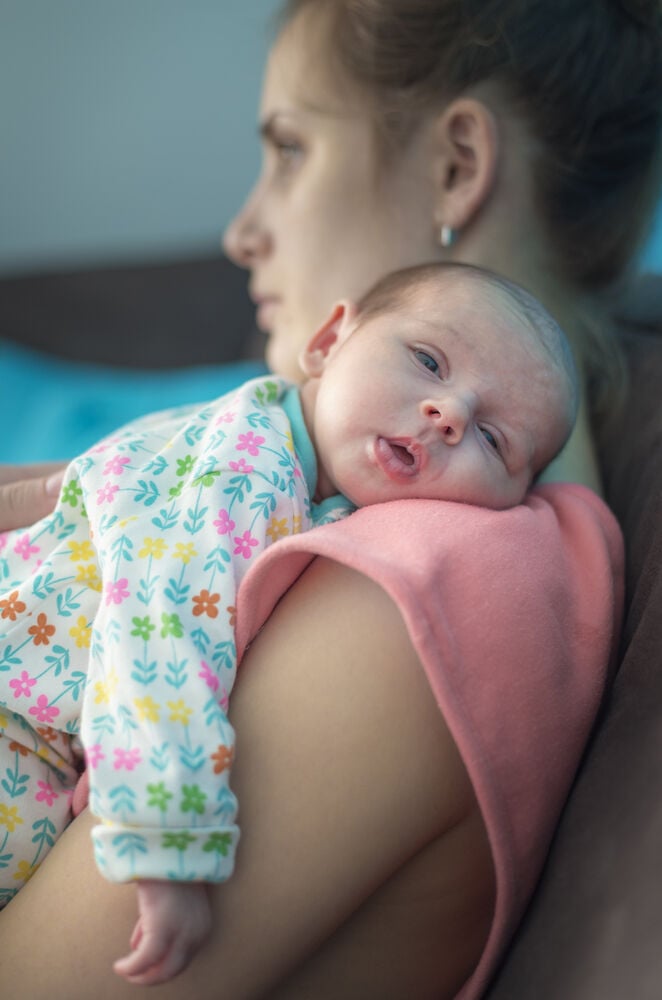Giving birth to a baby and getting used to new life isn’t easy at all, and it is normal for new moms to feel constantly tired. But if you start feeling sad, anxious and hopeless after delivery, these can be the warning signs of a really serious issue known as postpartum depression.
-
Tracking cycle
-
Getting pregnant
-
Pregnancy
-
Help Center
-
Flo for Partners
-
Anonymous Mode
-
Flo app reviews
-
Flo Premium New
-
Secret Chats New
-
Symptom Checker New
-
Your cycle
-
Health 360°
-
Getting pregnant
-
Pregnancy
-
Being a mom
-
LGBTQ+
-
Quizzes
-
Ovulation calculator
-
hCG calculator
-
Pregnancy test calculator
-
Menstrual cycle calculator
-
Period calculator
-
Implantation calculator
-
Pregnancy weeks to months calculator
-
Pregnancy due date calculator
-
IVF and FET due date calculator
-
Due date calculator by ultrasound
-
Medical Affairs
-
Science & Research
-
Pass It On Project New
-
Privacy Portal
-
Press Center
-
Flo Accuracy
-
Careers
-
Contact Us
11 Early Signs of Postpartum Depression Every New Mom Should Be Aware Of


Every piece of content at Flo Health adheres to the highest editorial standards for language, style, and medical accuracy. To learn what we do to deliver the best health and lifestyle insights to you, check out our content review principles.

If you or someone you know is going through a difficult time, remember that there are ways to get help. Here are some support services and resources in your country.
Find out moreWhat is postnatal depression?
Postpartum depression (PPD) is a common condition that hits approximately 2 in every 10 women (20%). Depression can start during the first year, mainly few weeks after the baby is born.
It is a serious condition that can affect the parents' ability (yes, new dads can experience depression as well) and desire to take care of themselves and their baby.
What causes postnatal depression?
The exact risk factors that cause postnatal depression are not known yet. Some researchers think that postpartum depression is related to the hormonal changes that occur after birth.
Some of the risk factors that are thought to be the strongest for causing postnatal depression include:
- Previous personal or family history of mental health conditions (it can be depression or bipolar disorder)
- Lack of social life and support, and not having many friends and family
- Lack of communication with the partner or poor relationship
- Significant stress during or after the pregnancy. The stress can be caused by major life events (losing a loved one, losing the job, etc.)
- Unexpected pregnancy
- Complicated pregnancy and birth
- The baby is born with health issues or special needs
- Excess 5-hydroxytryptamine (5HT-2) receptors in the frontal cortex of the brain
- Using drugs and alcohol during pregnancy
- Being unemployed or financially unstable.
What are the symptoms of postpartum depression?

The symptoms of postpartum depression can be hidden at first and may be difficult to recognize.
Some of the common signs of postpartum depression include:
- Psychomotor retardation (a paucity of spontaneous movement, or sluggish thought process), or psychomotor agitation
- Recurrent thoughts of death and suicide, or suicide attempts
- Lack of interest towards the baby
New moms who are suffering from postpartum depression will find no joy in their new role as a mother. The responsibilities that the motherhood is bringing are giving them the feeling of being trapped.
- Feeling exhausted
It is really normal for new parents to feel tired and exhausted all the time. But still they are motivated by the happiness that their new child brings them, and they are not having difficulties in doing their responsibilities. On the other hand, moms that are suffering from postnatal depression are having a lack of motivation and they don't have a desire to take care of the baby.
- Poor appetite with weight loss
- Decrease in sexual drive
According to the conducted studies, it is normal for the woman to experience a lack of sex drive in the first months after giving birth. Sometime this happens due to weight gain and having a different image of the body. Who would constantly think about postpartum sex with all of the responsibilities like breastfeeding and changing diapers? But this lasts only for a short period. If several months have passed, and the woman is still experiencing a lack of set drive, she may be suffering from PPD - postpartum depression.
- Ideas of worthlessness, inappropriate guilt
- Reduced ability to concentrate
- Sleep disorders
- Decreased sleep/early waking
Most of the new moms can’t sleep like a normal person in the beginning - that’s normal. However, you can't fall asleep and the rest while the baby is sleeping or if you're sleeping more than you were sleeping before being pregnant, you should look for other possible symptoms of postnatal depression.
- Loss of interest or pleasure – anhedonia
If you are no longer having an interest in things that you like doing, and you find yourself crying every day and being unhappy, you might be experiencing a postpartum depression. This is one of the first signs you are depressed. If you are not having an interest in doing things that you loved to do alone or together with your partner, it is a good idea to talk to your doctor.

Where to get help for postpartum depression?
Postpartum depression can be diagnosed only by a doctor. If you are experiencing some of the symptoms mentioned above, make an appointment today, call 911 or go to the nearest hospital in your area.
You can also call the National Suicide Prevention Hotline - 1-800-273-8255 (if you're located in the US), or your local one.
If the doctor concludes that you are having postnatal depression, there are several types of treatment that can improve your mental health.
What helps postpartum depression, apart from the prescribed medicine?
There are several things that you can do to help yourself after being diagnosed with postpartum depression, including:
- Be with people that care about you and love you
- Try to be calm and relaxed continuously
- Exercise everyday
- Try to do funny things to cheer up
- Track your symptoms.
Summing up
Remember that all of the symptoms require attention and you should ask for a medical help as soon as you notice any change in your mood or any of the signs mentioned above.
Without being treated, postpartum depression can force you to do things that you wouldn't naturally do.
In order to avoid any further harm to yourself or your baby, reach out for help. Postpartum depression can be cured and you will retrun to your normal self. Don’t miss the opportunity to enjoy your life in a new role.


Hey, I'm Anique
I started using Flo app to track my period and ovulation because we wanted to have a baby.


The Flo app helped me learn about my body and spot ovulation signs during our conception journey.


I vividly
remember the day
that we switched
Flo into
Pregnancy Mode — it was
such a special
moment.
Real stories, real results
Learn how the Flo app became an amazing cheerleader for us on our conception journey.
References
National Institute of Mental Health: “Postpartum Depression Facts.” American Academy of Pediatrics: “Depression During & After Pregnancy: You Are Not Alone.” American College of Obstetrics and Gynecology: “Postpartum Depression.”
https://www.nimh.nih.gov/health/publications/postpartum-depression-facts/index.shtml

